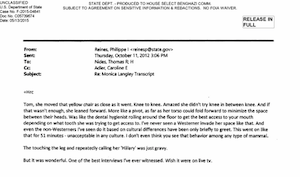WASHINGTON -- Hillary Clinton's former chief of staff, Cheryl Mills, and two other staff members were granted immunity deals in exchange for their cooperation in the now-closed FBI investigation into Clinton's use of a private email server as secretary of state, a Republican congressman said.
FULL ELECTION COVERAGE
Rep. Jason Chaffetz, chairman of the House Oversight and Government Reform Committee, said Friday that Mills gave federal investigators access to her laptop on the condition that what they found couldn't be used against her.
Democrats on the committee said Friday that the immunity agreements were limited in scope and did not cover statements made to investigators, or apply to potential testimony before Congress.
Still, Chaffetz said he was "absolutely stunned" that the FBI would cut a deal with someone as close to the investigation as Mills. By including the emails recovered from the laptops in the immunity agreements, the Justice Department exempted key physical evidence from any potential criminal case against the aides.
"No wonder they couldn't prosecute a case," said Chaffetz, R-Utah. "They were handing out immunity deals like candy."
Copies of the immunity agreements were provided to the House oversight committee by the Justice Department this week under seal.
Clinton's campaign spokesman, Brian Fallon, accused House Republicans of "trying to make something out of nothing by rummaging through the files of a Justice Department investigation that was closed months ago without any charges whatsoever, and leaking selective details three days before the first presidential debate."
"Congressman Chaffetz continues to abuse his office by wasting taxpayer dollars to try to second-guess the FBI in what amounts to a desperate attempt to boost Donald Trump's chances against Hillary Clinton," Fallon said.
A yearlong investigation by the FBI focused on whether the Democratic presidential nominee sent or received classified information using the private server located in the basement of her New York home, which was not authorized for such messages.
FBI Director James Comey said in July that his agents hadn't found evidence to support any criminal charge or direct evidence that Clinton's private server had been hacked. He suggested that hackers working for a foreign government may have been so sophisticated they wouldn't have left behind any evidence of a break-in.
Chaffetz said that in addition to Mills, others granted immunity include John Bentel, then-director of the State Department's Office of Information Resources Management, and Heather Samuelson, Clinton's executive assistant.
Beth Wilkinson, the lawyer representing Mills and Samuelson, said the text of the immunity agreements show investigators considered her clients "to be witnesses and nothing more." Her office declined to provide copies of the agreements.
"The Justice Department assured us that they believed my clients did nothing wrong," Wilkinson said. "At all points my clients cooperated with the government's investigation, including voluntarily participating in interviews with the FBI and DOJ."
The latest revelation brings the total number of people who were granted immunity as part of the FBI's investigation to at least five.
It had previously been reported immunity had been granted to Bryan Pagliano, a tech expert who set up Clinton's email server, as well as Paul Combetta, a computer specialist for a private firm that later maintained Clinton's email setup.
Chaffetz said he is looking forward to asking Comey questions about the immunity deals when Comey testifies Wednesday before the House Judiciary Committee. Chaffetz is also a member of that panel.
Mills, who was among Clinton's closest confidants, voluntarily appeared last year for a lengthy interview as part of the House GOP's investigation into the 2012 attack on a U.S. diplomatic compound in Benghazi, Libya, that left three Americans dead.
Pagliano and Combetta, however, have refused to testify before Congress by invoking their Fifth Amendment rights against self-incrimination. On Thursday, the GOP-led House oversight committee voted along party lines to hold Pagliano in contempt of Congress for failing to comply with its subpoena.
On Friday evening, the FBI released 189 additional pages of documents from its investigation, including notes of agents' interviews with Mills and Jake Sullivan, a top foreign-policy adviser to Clinton.
A federal judge also ordered the State Department to finish preparing roughly 1,000 pages of Clinton's emails for release by Nov. 4, a more protracted timetable.
In August, the judge, James Boasberg of U.S. District Court, ordered the State Department to accelerate the release of nearly 15,000 new emails. But Boasberg, an appointee of President Barack Obama, acknowledged the burden for the department's lawyers in reviewing thousands of emails.
Under the order issued on Friday, in a lawsuit brought by conservative legal group Judicial Watch, the State Department will release 350 pages of emails by Oct. 7, 350 pages by Oct. 21, and another 350 by Nov. 4. After that, it will produce 500 pages a month. Boasberg summoned the lawyers for another status report on Nov. 7, the day before the election.
Information for this article was contributed by Michael Biesecker and Eric Tucker of the Associated Press and by Mark Landler of The New York Times.
A Section on 09/24/2016
